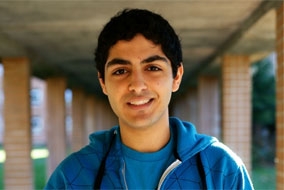
“Knowing that I’m learning new things on a regular basis actually keeps me extremely motivated… it’s one of the things I love most about engineering.”
UBC engineering student Armin Rezaiean-Asel has been recognized by Youth in Motion as one of Canada’s Top 20 Under 20, an award that celebrates and honours Canadians under the age of 20 who have demonstrated a significant level innovation, leadership and achievement.
After graduating secondary school with an impressive 100% average, Rezaiean-Asel became the youngest person and only Canadian to obtain an internship with the Council of Europe in Belgium in 2012. Motivated by a strong desire to give back to others, Armin created Vawper International—a collaborative network for youth to promote community action. For his work, Rezaiean-Asel received the Queen Elizabeth II Diamond Jubilee Medal.
Rezaiean-Asel transferred into engineering from the commerce program in his second year at UBC after realizing that the undergraduate business experience was not the right fit. “I needed a program that would push me more on an academic level,” Rezaiean-Asel said. “I know that I’ll stumble upon business again in the future, but for the time being, engineering is where I belong.”
He will be starting the Mech 2 program this fall, with hopes of pursuing the Mechatronics option.
Here is more on what Rezaiean-Asel has to say about his time at UBC and his future career in engineering:
What do you enjoy most about engineering?
As frustrating as it can sometimes get, I really enjoy the academic challenge that comes with engineering. It pushes me to constantly work hard throughout the entirety of my educational experience, while allowing me to actually learn new things on a consistent basis. Knowing that I’m learning new things on a regular basis actually keeps me extremely motivated to succeed in this program – it’s one of the things I love most about engineering.
How do you feel a degree in engineering will benefit you compared to a different field of study?
A degree in engineering will, above all else, provide me with the background to think more analytically. I think that’s a skill that I’ll definitely put to use the most in my future work. And even though I’m still quite early in my studies, when I graduate, I think I’ll be left with more experience viewing problems from both a macro and micro level, seeing the bigger picture and being able to concentrate on smaller details at the same time.
So far, what are some of your most memorable and valuable UBC experiences?
Any experience where I’ve gotten involved and met new people would be on this list. I don’t think people around me realize this, but every time I’ve gotten involved with something (Residence councils, CUS, EUS, AMS, campus-wide campaigns, etc.), I’ve learned lessons – from the people I’ve worked with – that I’ve consciously been putting into action in my everyday life and new involvements. There are a lot of people on campus that I’ve looked up to and learned from, so I think being around those types of individuals would have to be among my most valuable UBC experiences.
How will you use your degree to make a difference in the world?
Having worked with a few different organizations that tackle developmental, human rights, and democracy related issues, such as the Council of Europe, UNESCO, and the British Council, I’m really passionate about that type of work. I think it’s what I mentioned before – the way of thinking and analyzing that an engineering degree helps students develop. That’s one of my biggest draws to the program, and I think when I’m working in the aforementioned areas doing the type of work I love, I’ll be taking advantage of the lessons I learned throughout my degree that relate to thinking critically and analyzing a given problem from different viewpoints. In my opinion, the development of this analytical and critical way of thinking is something that often goes unnoticed and undervalued when people think of engineering educations.
What advice would you give to incoming engineering students?
If I could give one piece of advice to any student, especially in engineering, it would just be not to focus entirely on the educational component of university. As important as it is, there’s so much more to be learned outside of the classroom. Some of the greatest lessons I’ve absorbed have been acquired through travelling, working on projects with others, starting my own initiatives, or even seeking unconventional opportunities that interested me, regardless of my chances of succeeding.
Another thing – if you really want to grow, become more self-aware and succeed to your fullest potential, so don’t be afraid of failure. I’m not talking about failing classes here, but rather failing in some other area. I’ve been rejected from positions that I’ve applied for in the past couple of years (on and off campus), had my emails ignored by companies and organizations at which I wanted to work, and have failed in so many other areas. But at the end of the day, I think my success is largely a result of these setbacks.